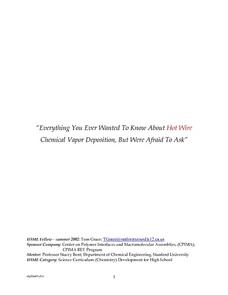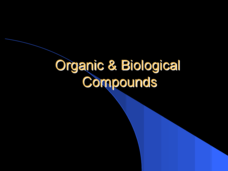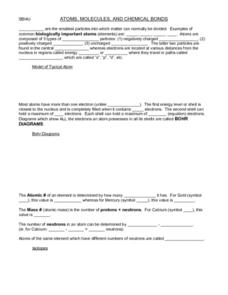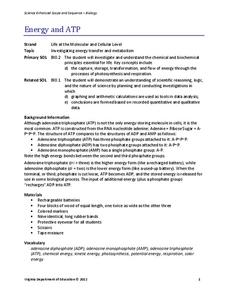Curated OER
Atoms and Chemical Bonding
An online resource, this worksheet has your chemistry learners complete four data tables with information about atoms and chemical bonds. The first table addresses atomic number and mass, as well as numbers of protons, neutrons, and...
Virginia Department of Education
Physical and Chemical Properties of Water
How can you effectively provide detailed concepts of water properties to your high school class in a way they find exciting and challenging at the same time? By letting them play, of course! Through a variety of experiments, pupils...
Curated OER
Everything You Ever Wanted To Know About Hot Wire Chemical Vapor Deposition, But Were Afraid To Ask
To wrap up your year of general chemistry, have lab groups compete in a tot wire chemical vapor deposition (HWCVD) competition. With their foundation in chemical nomenclature, stoichiometry, and gas laws, each group completes several...
Curated OER
Sample Midyear Examination (Chemistry and Biology)
A 12-page midterm exam sample can be given to young scientists in preparation for an exam. This particular installment is geared toward a class that delves into both ecology and chemistry concepts. There is no way to separate the 50...
Curated OER
Essential Elements
A color-coded periodic table identifies organic elements, major minerals, and trace elements. Oxidation states are highlighted and types of chemical bonding are annotated. The electron energy level chart is explained. Though not all of...
Curated OER
Chemical Context of Life & Water
Some basic chemistry concepts are fundamental to understanding biology. Learners explore how molecular structure plays a role in biological processes, especially the structure of the water molecule. The final page focuses on water's...
Pearson
The Chemical Context of Life
An educational presentation includes atoms, molecules, the four major elements, as well as neutrons and protons. Additionally, slides focus on atomic number, mass number, atomic weight, polar and nonpolar covalent bonding, ionic bonds,...
Science Geek
Covalent Bonding
When it comes to covalent bonds, sharing is caring. Presentation covers the octet rule with multiple examples, Lewis Dot Structures with an example, and resonance. Presentation is the first in a five-part series.
Curated OER
Organic and Biological Compounds
Carbon as a building block for organic compounds is demonstrated by diagrams and facts for its bonding style. Saturated and unstaturated hydrocarbons are detailed and facts about biological compounds such as proteins, nucleic acids,...
Curated OER
Chemistry of Life Study Guide
Biology learners should understand a few chemistry basics. Here is a worksheet that introduces them to the concepts of chemical reactions, molecular bonding, and the unique combination of properties that make water vital to life....
LABScI
Atomic Structure and the Periodic Table of Elements: The Secret Agent Lab
Food always gets attention! Model atomic structure using fruit loops to represent the subatomic particles. After building models, scholars create ionic bonds using their models. Finally, they use these concepts to create a periodic table.
Curated OER
Yeast Fermentation
Students measure the temperature change involved in the production of carbon dioxide by yeast. They also identify products and reactants in a chemical and balance the equation.
Curated OER
Atoms, Molecules, and Chemical Bonds
In this atoms worksheet, students review the parts of an atom, Bohr diagram, atomic number, mass number, and covalent bonds. This worksheet has 5 drawings and 26 fill in the blank questions.
Curated OER
Biologically Important Molecules
In this biologically important molecules worksheet, students fill in the blank with information about carbohydrates, lipids, and proteins. Students also make notes about nucleic acids.
Serendip
How Do Biological Organisms Use Energy?
When an organism eats, how does food become energy? Young biologists follow glucose through the process of cellular respiration to the creation of ADP using a discussion-based activity. The resource also highlights conservation of mass...
Virginia Department of Education
Energy and ATP
Take charge of your biology class by using this exciting analogy to relate the ATP process with batteries. Pupils use batteries and rubber bands to simulate the phosphate bonds between molecules in the body. They measure the distance in...
Curated OER
ATP in a Molecule
In this cell energy worksheet, learners review how ATP is formed and broken down and the uses of cell energy. This worksheet has 8 fill in the blank and 2 short answer questions.
Curated OER
The Chemistry of Life
After studying the different aspects of atoms and their reactivity, pupils will find this summary PowerPoint useful for review. Some of the slides are informative with labeled diagrams; others give important vocabulary. Teachers may want...
Curated OER
Atoms and Elements: An Introduction
Students are able to discuss the difference between a proton, a neutron and an electron. They also can explain the difference between an ionic and a covalent bond. Students know the main structure of atoms and molecules. Student are able...
Biology Junction
Chemistry
You matter—unless you multiply yourself by the speed of light squared, then you energy! Scholars learn about matter, energy, the elements and so much more using an informative presentation. Completing the included worksheet creates a...
National Institute of Open Schooling
Coordination Compounds
Cyanide, a coordination compound, is used in the extraction of gold and silver. Part 24 in the series of 36 delves into the world of coordination compounds. Classes learn, through readings, discussions, and answering questions, how to...
Virginia Department of Education
The Effects of Heat and Acid on the Enzyme Catalase
How quickly do enzymatic reactions occur? Assist the class as they examine heat and pH change to determine the rate of chemical reactions using catalase as an enzyme. Watch them "glow" with excitement!
Curated OER
Cellular Respiration: Harvesting Chemical Energy
A complete overview of oxidation, reduction, and how electrons are moved in respiration. You could use this slide show to elaborate on the concept of harvesting stored energy, and to summarize the stages of aerobic and anaerobic metabolism.
Biology Junction
Bioenergetics
Bioenergetics strives to describe how living things gain and transform energy for biological purposes. First, pupils learn about the types of energy before exploring the importance of energy in biological processes. Next, they discover...

























